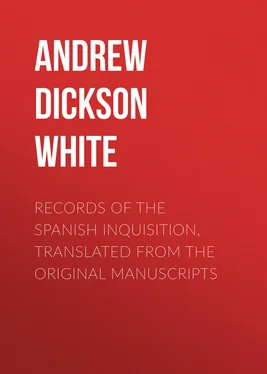Andrew Dickson White - Records of the Spanish Inquisition, Translated from the Original Manuscripts
Здесь есть возможность читать онлайн «Andrew Dickson White - Records of the Spanish Inquisition, Translated from the Original Manuscripts» — ознакомительный отрывок электронной книги совершенно бесплатно, а после прочтения отрывка купить полную версию. В некоторых случаях можно слушать аудио, скачать через торрент в формате fb2 и присутствует краткое содержание. Жанр: foreign_prose, foreign_religion, Философия, foreign_psychology, foreign_antique, на английском языке. Описание произведения, (предисловие) а так же отзывы посетителей доступны на портале библиотеки ЛибКат.
- Название:Records of the Spanish Inquisition, Translated from the Original Manuscripts
- Автор:
- Жанр:
- Год:неизвестен
- ISBN:нет данных
- Рейтинг книги:3 / 5. Голосов: 1
-
Избранное:Добавить в избранное
- Отзывы:
-
Ваша оценка:
- 60
- 1
- 2
- 3
- 4
- 5
Records of the Spanish Inquisition, Translated from the Original Manuscripts: краткое содержание, описание и аннотация
Предлагаем к чтению аннотацию, описание, краткое содержание или предисловие (зависит от того, что написал сам автор книги «Records of the Spanish Inquisition, Translated from the Original Manuscripts»). Если вы не нашли необходимую информацию о книге — напишите в комментариях, мы постараемся отыскать её.
Records of the Spanish Inquisition, Translated from the Original Manuscripts — читать онлайн ознакомительный отрывок
Ниже представлен текст книги, разбитый по страницам. Система сохранения места последней прочитанной страницы, позволяет с удобством читать онлайн бесплатно книгу «Records of the Spanish Inquisition, Translated from the Original Manuscripts», без необходимости каждый раз заново искать на чём Вы остановились. Поставьте закладку, и сможете в любой момент перейти на страницу, на которой закончили чтение.
Интервал:
Закладка:
Before me—
Miguel Rodriguez.In the Royal Palace of the Inquisition of Barcelona, on the twentieth day of September, one thousand six hundred and thirtyfive, the Inquisitor, Dr Domingo Abbad y Huerta being at his morning audience, ordered the above Pedro Ginesta to be brought from prison, which being done, and the prisoner present, he was
Questioned, if he remembered anything which he was bound to declare, according to the oath he had sworn.
Answered, that he had nothing more to say.
The prisoner was then informed that Dr Francisco Magrina, whom he had selected for his counsel, was present, with whom he might confer, and make arrangements for his defence.
Dr Francisco Magrina was then sworn in verbo sacerdotis , to defend well and faithfully the said Pedro Ginesta, to inform him if his case was not on the side of justice, to do everything which a good advocate is bound to do, and to preserve secrecy throughout.
Then were produced and read, the several confessions of the said Pedro Ginesta, made from the eighteenth of this month to the present time, with the accusation, and the answers of the prisoner. These he examined, and conferred with the prisoner respecting his case, counselling him, as the best defence which could be made, to confess the whole truth, and if he had been guilty of any offence, to beg for pardon; by which means, he might obtain mercy.
The said Pedro Ginesta replied that he had declared the whole truth as appeared by his confessions, that beyond this he denied everything contained in the accusation, and in consequence begged to be acquitted and set at liberty.
The Inquisitor then ordered a copy of the above to be given to the Promoter Fiscal of the Holy Office, who declared, that, confining himself to what he had stated in his accusation and to the matter contained in the confession of the prisoner, he requested that they might proceed to the proofs. The Inquisitor replied that the cause should be judged definitively, and the proofs on both sides received salvo jure impertinentium et non admittendorum , according to the style of the Holy Office, and the same was notified to both parties.
The Promotor Fiscal then declared that he reproduced the testimony which had been received and registered against the said Pedro Ginesta in this Holy Office, which testimony he desired might be examined and ratified in form; and also that all other necessary investigations might be made and the testimony published; whereupon the audience closed, and the prisoner being admonished to bethink himself well, and declare the truth, was remanded to prison.
Before me—
Miguel Rodriguez.In the Royal Palace of the Inquisition of Barcelona, on the sixth day of October, one thousand six hundred and thirtyfive, the Inquisitor, Dr Domingo Abbad y Huerta, being at his morning audience, ordered the above Pedro Ginesta to be brought from the secret prison, which being done, and the prisoner present, he was
Questioned, if he remembered anything which he was bound to declare according to the oath he had sworn.
Answered, that he had nothing more to say.
The prisoner was then informed that the Promotor Fiscal of the Holy Office had requested a publication of the testimony against him, before which it would be well for him to declare the whole truth, as this would cause him to experience more benignity and mercy.
Answered, that he had nothing to add to his former confessions; that it was true that he had eaten bacon on St Bartholomew’s eve, but had done it through ignorance, not knowing it to be a fast; that he begged pardon for his offence, having all the rest of his life conducted in a different manner.
Straightway appeared the Promoter Fiscal and requested publication of the testimony against the said Pedro Ginesta according to the style of the Holy Office. The Inquisitor ordered the publication to be made, concealing the names of the witnesses and other circumstances which might cause their persons to be known, according to the orders and style of the Holy Office, which was done in the manner following.
Publication of the testimony against Pedro Ginesta, native of the village of St Quinti, diocese of St Flor, in the kingdom of France.
A certain witness, sworn and qualified in the proper time and manner in the town of Tremp, bishopric of Urgel, on a certain day of the month of August, in the present year sixteen hundred and thirtyfive—declares, &c. [ Here follows the testimony of Joan Compte as given before. ]
Another witness sworn and qualified in the proper time and manner in the town of Semiana, &c. [ Here follows the testimony of Geronima Aymar. ]
Another witness &c. [ All the other testimony repeated. ]
The above testimony having been published, an oath was exacted from the prisoner to declare the truth in answer to the testimony aforesaid, article by article, and the same having been read to him de verbo ad verbum , he answered as follows;—
To the first article he replied that it was true he had eaten the bacon, but had done it through ignorance, having forgotten that it was St Bartholomew’s eve, as he had already confessed, and that on being apprised of the same, he had left off eating.
To the second article he answered that the hostess might possibly have said what she states, but that he had no recollection of it.
To the third article he answered that he repeated his former declaration that he was a Catholic Christian, and had he known it to be the fast of St Bartholomew, should not have eaten upon any account.
To the fourth article he answered by referring to the confession which he had already made, and declared that he did not remember having been warned by any one.
To the fifth article he answered by referring to his confession, and declared that beyond this he denied everything sworn to by the witness.
The above is the truth according to the oath of the prisoner, and the same having been read in his hearing is declared by him to be faithfully recorded,
Dr Domingo Abbad y Huerta.Before me—
Damian Fonolleda, Sec’y .The Inquisitor then ordered the prisoner to be furnished with a copy of the above publication, that he might, with the assistance of his counsel, make arrangements for his defence, whereupon the prisoner was admonished, and remanded to prison.
In the Royal Palace of the Inquisition of Barcelona, on the ninth day of October, one thousand six hundred and thirtyfive, the Inquisitor, Dr Domingo Abbad y Huerta being at his morning audience, ordered the above Pedro Ginesta to be brought from prison, which being done, and the prisoner present, he was
Questioned, if he remembered anything which he was bound to declare in discharge of his conscience, according to the oath he had sworn.
Answered, that he had nothing more to say.
The prisoner was then informed that Doctor Francisco Magrina, his counsel, was present, with whom he might communicate and take measures for his defence. The publication of the testimony against the prisoner, with his answers to the same, were then read to the said Dr Francisco Magrina, who proceeded to confer with the prisoner about his defence. Having done this he received from the hands of the prisoner a sheet of paper, upon which he drew up articles of defence which were then read to the prisoner and he declared that he made a formal presentation of the same. Here follows the defence.
‘Although Pedro Ginesta, a native of France, and by trade a brazier, has no necessity for any defence against the charges brought against him by the Promotor Fiscal of this Holy Office, as may be clearly seen from the testimony; nevertheless, for greater security, and with an express declaration that his impeachment of the testimony of the witnesses against him, is not occasioned by a desire to injure them, but solely to defend himself, he states the following.
Читать дальшеИнтервал:
Закладка:
Похожие книги на «Records of the Spanish Inquisition, Translated from the Original Manuscripts»
Представляем Вашему вниманию похожие книги на «Records of the Spanish Inquisition, Translated from the Original Manuscripts» списком для выбора. Мы отобрали схожую по названию и смыслу литературу в надежде предоставить читателям больше вариантов отыскать новые, интересные, ещё непрочитанные произведения.
Обсуждение, отзывы о книге «Records of the Spanish Inquisition, Translated from the Original Manuscripts» и просто собственные мнения читателей. Оставьте ваши комментарии, напишите, что Вы думаете о произведении, его смысле или главных героях. Укажите что конкретно понравилось, а что нет, и почему Вы так считаете.












